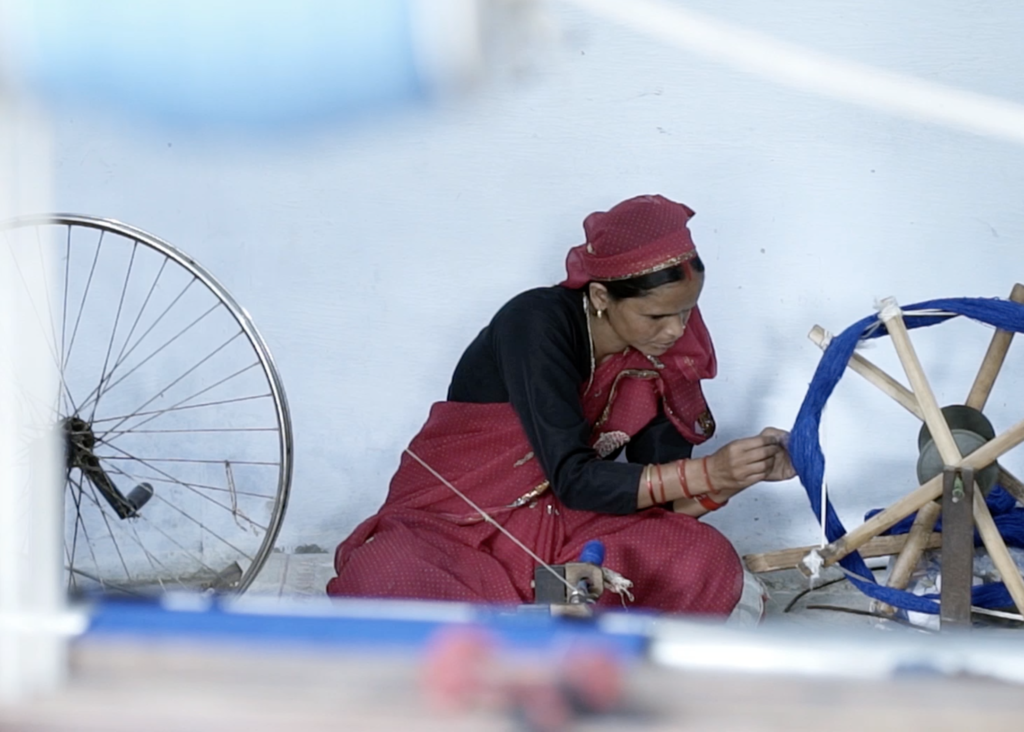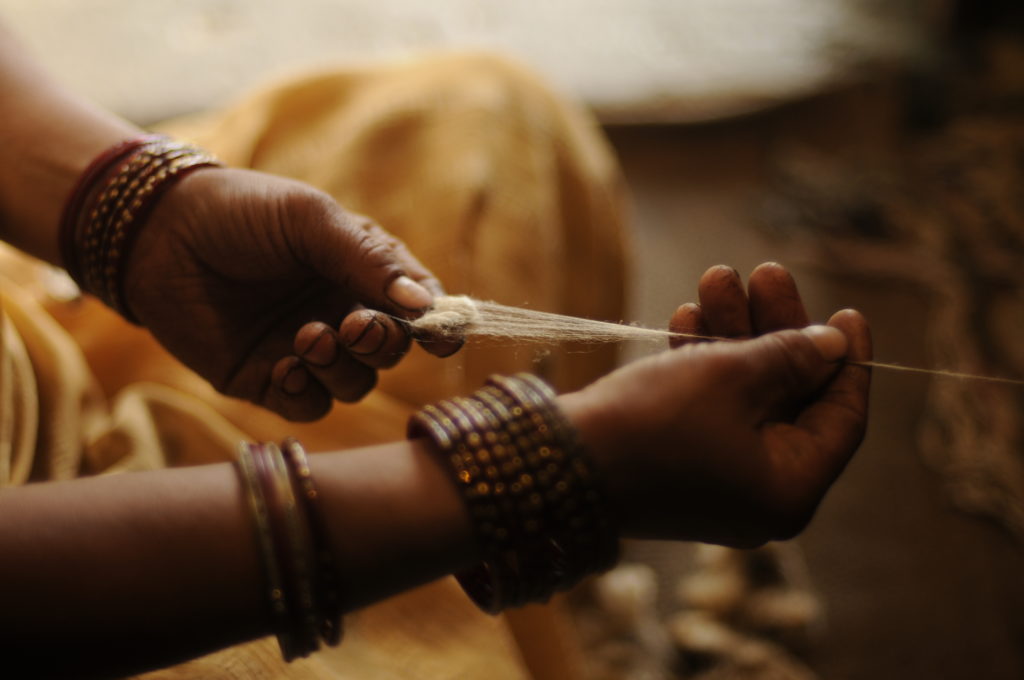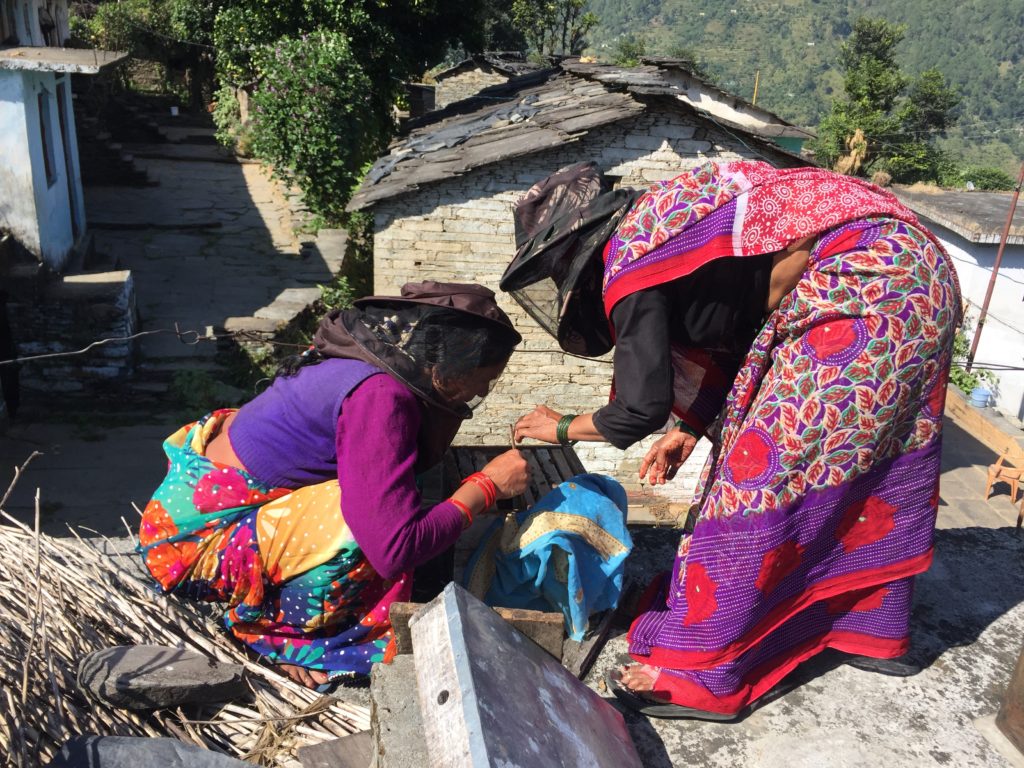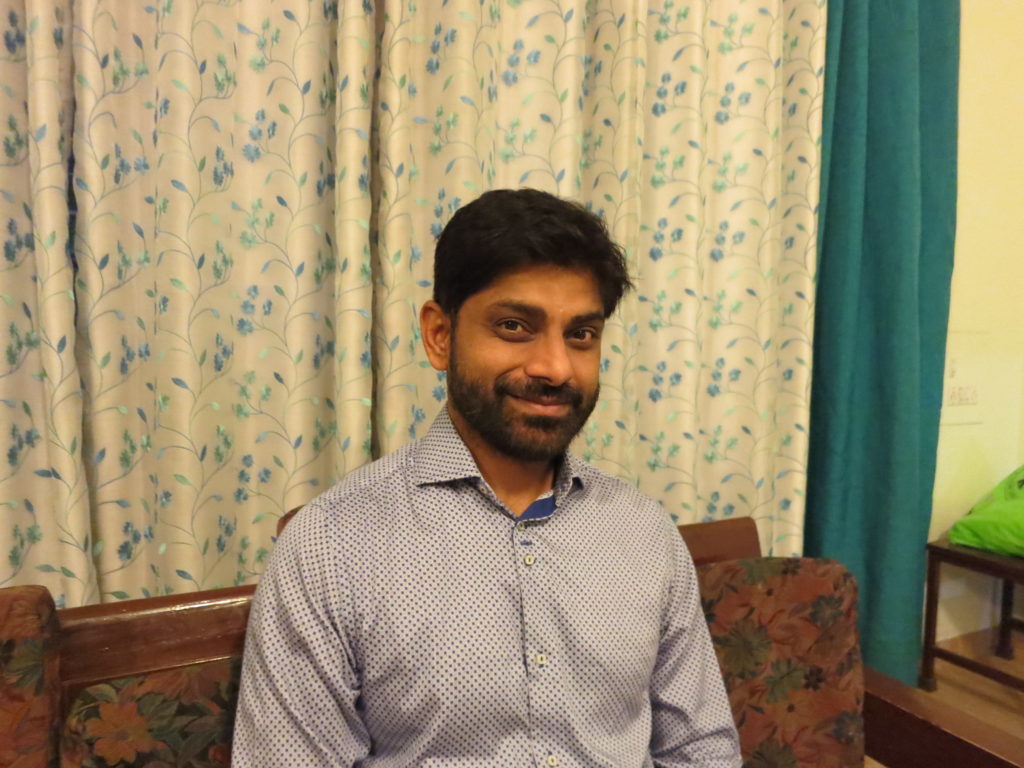◊ By Neelesh Gharmalkar
Note: To find organic brands, organic shops and organic wholesale suppliers in India, buy the Organic Directory
- In 1994, American economist, Dr Jack Croucher, along with Sharmila Ribeiro, Girish Bahuguna and SP Singh, formed an NGO called AT India (ATI). In 2007, ATI established Devbhumi, a farmer producer company, in the remote Himalayan state of Uttarakhand
- Devbhumi’s Board of Directors and 8,500 shareholders comprise local farmers
- ATI, as Devbhumi’s promoter, forms self-help groups, imparts skill-training on apiculture, organic cultivation and sericulture and aids the producers in all aspects of the value chain. Devbhumi assists them in procurement, processing, labelling and marketing
- The company’s key offerings are certified organic honey, organic spices, organic kidney beans and handwoven Tasar silk/wool stoles, shawls and scarves made from cocoons of oak, mulberry and castor leaf-fed silk worms. Eminent buyers include Fabindia, Karigar (The Netherlands) and United Colors of Benetton
- Devbhumi works with producers from 450 remote hill villages across 25 valleys and 6 districts of Uttarakhand
The Himalayan state of Uttarakhand is known as Devbhumi, meaning ‘Land of the Gods’. A popular tourist destination, it offers visitors congenial weather, refuge from urban pollution, breathtaking views of snow-capped Himalayan peaks, ethnic legacy foods, all-pervading scenic beauty, and of course, the holy river, Ganges. Despite its wide renown, however, the rural development of the state has been sluggish. The exacting terrain and remote location of the region play antagonists to the growth of its rural farmers, as they find themselves far removed from the market.
Growing only tubers and beans during the summer and virtually nothing during the winter, the local agrarian community does not view farming as a remunerative vocation. Therefore, by the busloads the locals migrate to urban cities in search of a living.

In the late 60s, Dr Jack Croucher, an economist and volunteer with the American Peace Corps, visited Uttarakhand and fell in love with the state and its people. In 1994—along with Sharmila Ribeiro, Girish Bahuguna and SP Singh—he founded AT India, which went on to establish the FPO Devbhumi. Today, Devbhumi boasts 8,500 shareholders comprising local farmers
DR JACK CROUCHER & ATI
Dr Jack Croucher and his peers, to a large extent, disrupted this exodus of farmers from rural Garhwal in Uttarakhand. In the late 60s, Croucher, an economist and volunteer with the American Peace Corps, visited the state and fell in love with it and its people. In 1994—along with Sharmila Ribeiro, Girish Bahuguna and SP Singh—he founded Appropriate Technology India, the Indian branch of American non-profit Appropriate Technology International, with the aim to study the biodiversity of the region and bring about sustainable development in the same.
Twenty-four-year-old ATI has been a linchpin in the progress of local farmers in Uttarakhand. It undertakes a variety of village-based conservation activities, which yield economic returns, thus rendering them sustainable.
Headquartered in Guptakashi in Rudraprayag district, ATI’s activities include capacity-building of women’s self-help groups (currently 1,015 in number), and facilitating income-enhancing activities that have either direct impact on biodiversity (ex, use of fodder grasses instead of biomass extraction from oak forests) or indirect impact (ex, elevating dairy farming from subsistence to commercial levels resulting in increased use of stall feeding and limited unmonitored grazing in the forest and alpine pastures).
DEVBHUMI—OF THE FARMERS, BY THE FARMERS, FOR THE FARMERS
When the need to market and brand the produce created by the self-help groups emerged, instead of tying up with a broker for bulk sales, a farmer producer company called Devbhumi Natural Products Producers Co Ltd was formed in 2007, thus retaining maximum profits for the farmers.
Devbhumi is one of the country’s pioneering farmer producer companies, and the very first of its kind in Uttarakhand. It is a separate entity from ATI, with its own Board of Directors and advisory group, and is owned by 8,500 producers (a majority of them being women of Uttarakhand) as shareholders, who employ professional staff to run its daily operations.
“Periodically, the shareholders nominate and appoint their contemporaries as directors,” says Devbhumi’s Chief General Manager, Amrish Khurana. ‘Conservation through Enterprise’ is ATI’s lodestar. It promotes organic farming, apiculture and sericulture in 450 remote hill villages across 25 valleys and 6 districts of Uttarakhand—Rudraprayag, Chamoli, Tehri Garhwal, Uttarkashi, Pauri Garhwal and Dehradun.

Cocoons are handspun into yarns that are naturally dyed and woven to produce Himalayan oak Tasar silk, Himalayan mulberry silk, Himalayan eri silk, as well as, handcrafted blends of wool and cotton


Local women of Uttarakhand have been trained in beekeeping and have turned into honey producers for the FPO
FARMER-TO-SHAREHOLDER
Devbhumi’s empowered producers turn into shareholders of the company once they start cultivating commercial crops. The company’s producer/shareholder families comprise beekeeping, dairymen, spice and pulses farmers, sericulture farmers, yarn spinners and weavers.
The FPO (Farmer Producer Organisation) is actively involved with its shareholders in organic production, post-harvest activities, processing, packaging, labelling and marketing. The company’s product line has 10 products including certified organic honey, certified organic spices, forest silk, certified organic rajma (kidney beans) and a host of natural dyes using indigenous plant material.
Devbhumi’s auxiliary services to its producers include doorstep collection of produce, storage facility, transport, as well as, provision of infrastructure for execution of value chain-based activities. Such support ensures producers a minimum economic return of Rs 5,000 to Rs12,000 per month. To further cater for the financial needs of the farmers, ATI has set up a self-microfinance company, Ushamath Mahila Mahasangh (UMM).
Farmers who were previously outliers in agribusiness are thrilled to find themselves transformed into shareholders of the very entity they supply. To them this represents a profound victory. “Life was tough and money was difficult to make,” says Meena Rana, a self-help group head from Augustmuni town, “until we were introduced to Devbhumi and UMM.”
“ATI has been working with us women farmers for a very long time and we have learned advanced and commercial beekeeping and silkworm rearing from them. Devbhumi buys our produce at a good price and markets it for us as well. One of our team members, Bimla Devi, has recently been elected on the Board of Directors of the company. It indeed is our company!” exults Rana.

With Fabindia, Karigar and United Colors of Benetton as customers, Devbhumi boasts 5 master weavers, 145 spinners and 35 handlooms
CORE AREAS OF FOCUS
Artisanal Forest Silk: Devbhumi’s village artisans hand-weave a variety of artisanal shawls, stoles and scarves. The fabric is derived from silk worms that feed on oak, mulberry and castor leaves in the forests of Garhwal. The cocoons are handspun into yarns that are dyed using natural or azo free dyes, and woven to produce Himalayan oak Tasar silk, Himalayan mulberry silk, Himalayan eri silk, as well as, handcrafted blends of wool and cotton.
Boasting 5 master weavers, 145 spinners and 35 handlooms, Devbhumi’s monthly production volume for silk is 12,600 metres, and the company’s eminent buyers include Fabindia, Karigar (The Netherlands) and United Colors of Benetton.
The company’s oak forest silk production commenced in 1995 as a strategy to conserve the last few remaining oak forests of the Himalayas. The income from forest-based sericulture has become an economic incentive for the local community to contribute to the conservation of the Himalayan ecosystem.
Organic Honey: Devbhumi’s certified organic honey, which is derived from the Apis Cerana honeybee, was the first honey in India to be certified organic, in the year 1996. In addition to organic honey, Devbhumi also procures and markets non organic multiflora and litchi honey.
Approximately 80 tonnes of Himalayan honey are processed every year at the FPO’s plant in the Mohabbewala Industrial Area of Dehradun, and is sold in both domestic and international markets.
Organic Spices: Organic spices (red chilli, ginger, coriander, turmeric, large cardamom) pulses and organic rajma, indigenous to the Himalayan region are marketed by Devbhumi under its eponymous brand name.
WHAT IS A FARMER PRODUCER ORGANISATION (FPO)?
Farmer producer organisations (also known as farmer producer companies or FPCs) are firms registered under the Ministry of Corporate Affairs for the welfare of farmers. These companies are of the farmers, by the farmers and for the farmers; ie, shareholders, as well as, directors of the company are farmers. Such a company is a collective effort to grow, collect, process and market farm produce, thus benefiting farmers and consumers alike.
A SUCCESSFUL BUSINESS MODEL
Devbhumi has been successful in achieving its objective of conserving biodiversity through enterprise. It has created a sustainable business model for the market growth of small and marginalised farmers. Today, the company enjoys a turnover of over Rs 2 crore (approx USD 2,78,000) annually.
The model leverages the working capital required to assist farmers from NABARD (National Bank for Agriculture and Rural Development) and other development banks. A key challenge of agriculture in remote regions is the severe lack of access to mainstream markets. By creating widespread supply chains and providing operational support, Devbhumi has been working constantly to catapult marginalised farmers into highly competitive markets.
In its ongoing endeavour to gain more market share for its farmer shareholders, Devbhumi now aspires to amplify its national and global presence, as well as, extend its inventory.
ABOUT THE AUTHOR

The author is director of Greencert Biosolutions Private Limited, one of the 29 accredited agencies for organic certification in India.



interesting story, since we are also working in Uttarakhand and on organic. it will be good learn from AT India
Delighted to know the activities of FPO Devbhumi.
Any thing to do with plant protection in an Organic way with – Zero Residue products – we would be honoured to participate.
We – Tropical Nano Science Bangalore – Karnataka – produce and export ( to UAE ) Zero residue , OMRI and IMO certified organic plant protection products for vegetable cultivation.
Our contact details are
email – [email protected]
Mobile – +91 9884454013
Contact person – Mr P Kulandaivadivel
General Manager